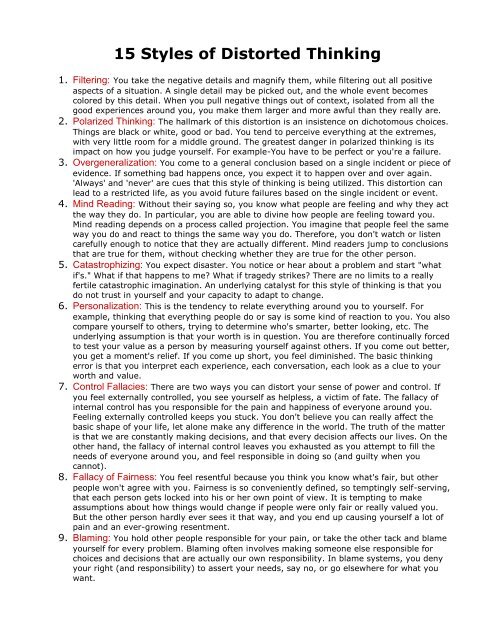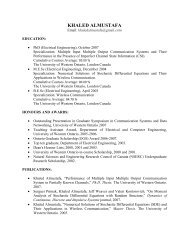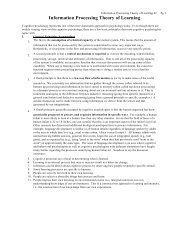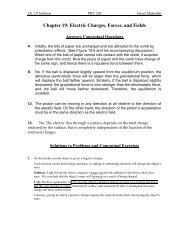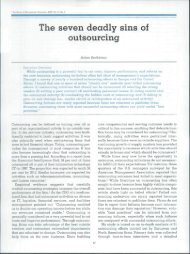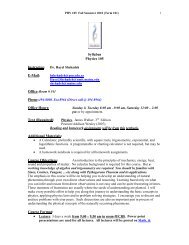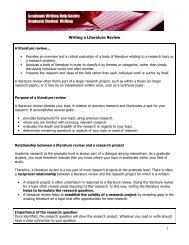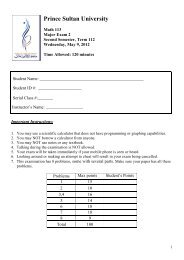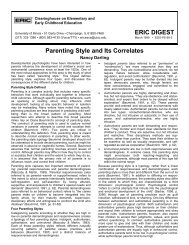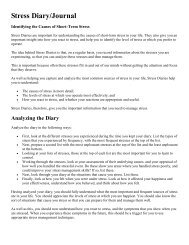15 Styles of Distorted Thinking - PSU
15 Styles of Distorted Thinking - PSU
15 Styles of Distorted Thinking - PSU
Create successful ePaper yourself
Turn your PDF publications into a flip-book with our unique Google optimized e-Paper software.
<strong>15</strong> <strong>Styles</strong> <strong>of</strong> <strong>Distorted</strong> <strong>Thinking</strong><br />
1. Filtering: You take the negative details and magnify them, while filtering out all positive<br />
aspects <strong>of</strong> a situation. A single detail may be picked out, and the whole event becomes<br />
colored by this detail. When you pull negative things out <strong>of</strong> context, isolated from all the<br />
good experiences around you, you make them larger and more awful than they really are.<br />
2. Polarized <strong>Thinking</strong>: The hallmark <strong>of</strong> this distortion is an insistence on dichotomous choices.<br />
Things are black or white, good or bad. You tend to perceive everything at the extremes,<br />
with very little room for a middle ground. The greatest danger in polarized thinking is its<br />
impact on how you judge yourself. For example-You have to be perfect or you're a failure.<br />
3. Overgeneralization: You come to a general conclusion based on a single incident or piece <strong>of</strong><br />
evidence. If something bad happens once, you expect it to happen over and over again.<br />
'Always' and 'never' are cues that this style <strong>of</strong> thinking is being utilized. This distortion can<br />
lead to a restricted life, as you avoid future failures based on the single incident or event.<br />
4. Mind Reading: Without their saying so, you know what people are feeling and why they act<br />
the way they do. In particular, you are able to divine how people are feeling toward you.<br />
Mind reading depends on a process called projection. You imagine that people feel the same<br />
way you do and react to things the same way you do. Therefore, you don't watch or listen<br />
carefully enough to notice that they are actually different. Mind readers jump to conclusions<br />
that are true for them, without checking whether they are true for the other person.<br />
5. Catastrophizing: You expect disaster. You notice or hear about a problem and start "what<br />
if's." What if that happens to me? What if tragedy strikes? There are no limits to a really<br />
fertile catastrophic imagination. An underlying catalyst for this style <strong>of</strong> thinking is that you<br />
do not trust in yourself and your capacity to adapt to change.<br />
6. Personalization: This is the tendency to relate everything around you to yourself. For<br />
example, thinking that everything people do or say is some kind <strong>of</strong> reaction to you. You also<br />
compare yourself to others, trying to determine who's smarter, better looking, etc. The<br />
underlying assumption is that your worth is in question. You are therefore continually forced<br />
to test your value as a person by measuring yourself against others. If you come out better,<br />
you get a moment's relief. If you come up short, you feel diminished. The basic thinking<br />
error is that you interpret each experience, each conversation, each look as a clue to your<br />
worth and value.<br />
7. Control Fallacies: There are two ways you can distort your sense <strong>of</strong> power and control. If<br />
you feel externally controlled, you see yourself as helpless, a victim <strong>of</strong> fate. The fallacy <strong>of</strong><br />
internal control has you responsible for the pain and happiness <strong>of</strong> everyone around you.<br />
Feeling externally controlled keeps you stuck. You don't believe you can really affect the<br />
basic shape <strong>of</strong> your life, let alone make any difference in the world. The truth <strong>of</strong> the matter<br />
is that we are constantly making decisions, and that every decision affects our lives. On the<br />
other hand, the fallacy <strong>of</strong> internal control leaves you exhausted as you attempt to fill the<br />
needs <strong>of</strong> everyone around you, and feel responsible in doing so (and guilty when you<br />
cannot).<br />
8. Fallacy <strong>of</strong> Fairness: You feel resentful because you think you know what's fair, but other<br />
people won't agree with you. Fairness is so conveniently defined, so temptingly self-serving,<br />
that each person gets locked into his or her own point <strong>of</strong> view. It is tempting to make<br />
assumptions about how things would change if people were only fair or really valued you.<br />
But the other person hardly ever sees it that way, and you end up causing yourself a lot <strong>of</strong><br />
pain and an ever-growing resentment.<br />
9. Blaming: You hold other people responsible for your pain, or take the other tack and blame<br />
yourself for every problem. Blaming <strong>of</strong>ten involves making someone else responsible for<br />
choices and decisions that are actually our own responsibility. In blame systems, you deny<br />
your right (and responsibility) to assert your needs, say no, or go elsewhere for what you<br />
want.
10. Shoulds: You have a list <strong>of</strong> ironclad rules about how you and other people should<br />
act. People who break the rules anger you, and you feel guilty if you violate the rules. The<br />
rules are right and indisputable and, as a result, you are <strong>of</strong>ten in the position <strong>of</strong> judging and<br />
finding fault (in yourself and in others). Cue words indicating the presence <strong>of</strong> this distortion<br />
are should, ought, and must.<br />
11. Emotional Reasoning: You believe that what you feel must be true-automatically. If<br />
you feel stupid or boring, then you must be stupid and boring. If you feel guilty, then you<br />
must have done something wrong. The problem with emotional reasoning is that our<br />
emotions interact and correlate with our thinking process. Therefore, if you have distorted<br />
thoughts and beliefs, your emotions will reflect these distortions.<br />
12. Fallacy <strong>of</strong> Change: You expect that other people will change to suit you if you just<br />
pressure or cajole them enough. You need to change people because your hopes for<br />
happiness seem to depend entirely on them. The truth is the only person you can really<br />
control or have much hope <strong>of</strong> changing is yourself. The underlying assumption <strong>of</strong> this<br />
thinking style is that your happiness depends on the actions <strong>of</strong> others. Your happiness<br />
actually depends on the thousands <strong>of</strong> large and small choices you make in your life.<br />
13. Global Labeling: You generalize one or two qualities (in yourself or others) into a<br />
negative global judgment. Global labeling ignores all contrary evidence, creating a view <strong>of</strong><br />
the world that can be stereotyped and one-dimensional. Labeling yourself can have a<br />
negative and insidious impact upon your self-esteem; while labeling others can lead to<br />
snap-judgments, relationship problems, and prejudice.<br />
14. Being Right: You feel continually on trial to prove that your opinions and actions are<br />
correct. Being wrong is unthinkable and you will go to any length to demonstrate your<br />
rightness. Having to be 'right' <strong>of</strong>ten makes you hard <strong>of</strong> hearing. You aren't interested in the<br />
possible veracity <strong>of</strong> a differing opinion, only in defending your own. Being right becomes<br />
more important than an honest and caring relationship.<br />
<strong>15</strong>. Heaven's Reward Fallacy: You expect all your sacrifice and self-denial to pay <strong>of</strong>f, as<br />
if there were someone keeping score. You fell bitter when the reward doesn't come as<br />
expected. The problem is that while you are always doing the 'right thing,' if your heart<br />
really isn't in it, you are physically and emotionally depleting yourself.<br />
*FromThoughts & Feelingsby McKay, Davis, & Fanning. New Harbinger, 1981. These styles <strong>of</strong><br />
thinking (or cognitive distortions) were gleaned from the work <strong>of</strong> several authors, including Albert<br />
Ellis, Aaron Beck, and David Burns, among others.


